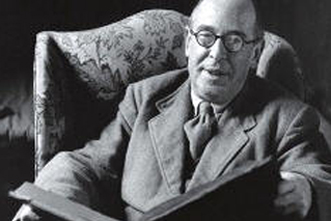The other historic death on November 22, 1963
Anyone my age or older can tell you where they were when they heard that President Kennedy had been shot. Few know that C. S. Lewis, the best-known theologian of the 20th century, died an hour earlier.
The similarities between the two are remarkable. Both were known to family and friends as “Jack.” Both were second sons. Both attended preparatory schools before enrolling in prestigious universities: Lewis at Oxford, Kennedy at Harvard. Both were decorated war veterans: Lewis was wounded in 1918 during the Battle of Arras; Kennedy survived the destruction of his Navy boat in 1943 and earned a Purple Heart for his heroics.
Both suffered tragic personal losses. Lewis’ mother died when he was nine; Kennedy’s older brother died while serving as a Navy pilot in 1944, his sister Kathleen was killed four years later in a plane crash, and his two-day-old son Patrick died on August 9, 1963. Both were famous authors: Kennedy won a Pulitzer Prize for Profiles in Courage, while Lewis wrote 40 books in his lifetime. More than 20 collections of his essays, letters, and poems have appeared after his death; his books have sold more than 200 million copies.
Both struggled with their faith. Lewis was a nominal Christian before his mother’s death, leaving the faith under the influence of an atheist tutor. He returned to belief in God in 1929 and made his commitment to Christ two years later. Kennedy was a life-long Catholic, but he struggled to reconcile his faith with aspects of his personal life and public policies.
Here’s one more similarity: neither could have imagined their impact 50 years after their deaths: John Kennedy established the Peace Corps, the NAVY Seals, and the Green Berets. His leadership was instrumental for the civil rights movement and the resolution of the Cuban Missile Crisis. He inspired a new generation of Americans to engage in public service; his example still calls us to “ask not what your country can do for you—ask what you can do for your country.”
Since C. S. Lewis’ death 50 years ago, more than 100 books have been written about him and his writings. By the centennial of his birth in 1998, there were four major biographies of Lewis, six collections of reminiscences, eight surveys of his fiction, and six others devoted specifically to The Chronicles of Narnia. Next to Scripture, the book that has influenced me most is Lewis’ Mere Christianity. Next to the Apostle Paul, Lewis has been the most important theologian in my life and faith.
We cannot measure the eternal significance of present faithfulness. How can you be sure that your life today will count for eternity? Let’s close with my favorite C. S. Lewis quote: “Aim at heaven and you will get earth thrown in. Aim at earth and you get neither.”
At what are you aiming today?












